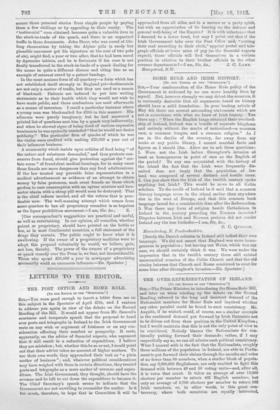HOME RULE AND IRISH HISTORY.
[To mom EDITOR Or THE "SPECTATOR."] SIR,—Your condemnation of the Home Rule policy of the Government is endorsed by no one more heartily than by myself. But, however strongly we may detest the measure, it is eminently desirable that all arguments based on history should have a solid foundation. In your leading article of May 4th there are several astounding statements which are not in accordance with what we know of Irish history. You there say : " When the English kings obtained their overlord- ship of Ireland, Ireland was a bundle of separate kingdoms and entirely without the marks of nationhood—a common race, a common tongue, and a common religion." As I am in the depths of the country, far away from my books or any public library, I cannot marshal facts and figures as I should like. Allow me to ask three questions :
1. Were not the Irish before Strongbow's invasion at least as homogeneous in point of race as the English of the period P To any one acquainted with the history of the island the fact that the Irish were frequently dis- united does not imply that the population of Ire- land was composed of several distinct and hostile racer.
2. Can you show that the Irish of the twelfth century spoke anything but Irish P This would be news to all Kehl.° scholars. To the credit of Ireland be it said that a common literary language arose in the island earlier than anywhere else in the west of Europe, and that this common book language lasted for a considerable time after the Reformation, 3. Was there any form of religion beside Catholicism in Ireland in the century preceding the Norman invasion ? Disputes between Irish and Norman prelates did not render Ireland any the less Catholio.—I am, Sir, &e., Maenclochog, N. Pembrokeshire. E. C. QUIGGIN.
[Surely the Danish colonies in Ireland still talked their own language. We did not assert that England was more homo- geneous in population ; but leaving out Wales, which was our case, we should certainly think it was. We were under the impression that in the twelfth century there still existed unreconciled remains of the Celtic Church and that the old rivalry between that Church and Rome continued to exist for some time after Strongbow's invasion.—En. Spectator.]










































 Previous page
Previous page